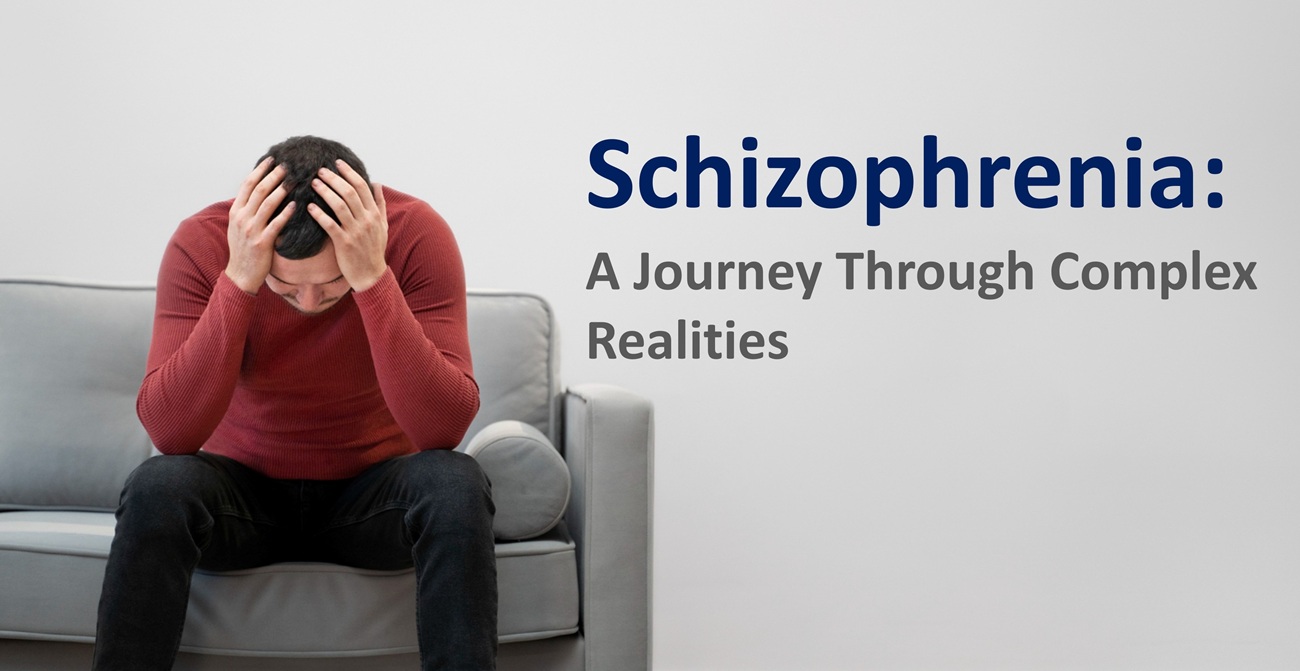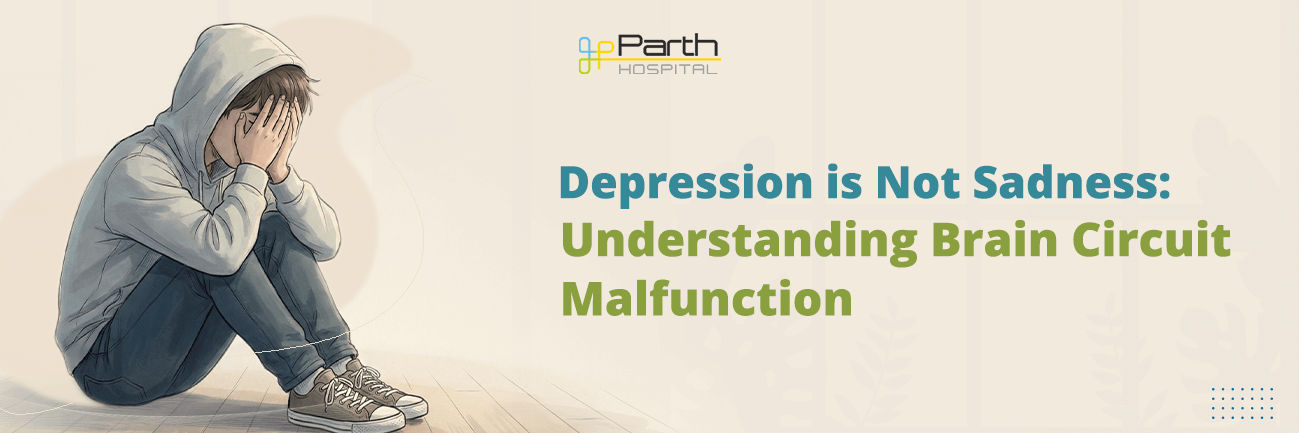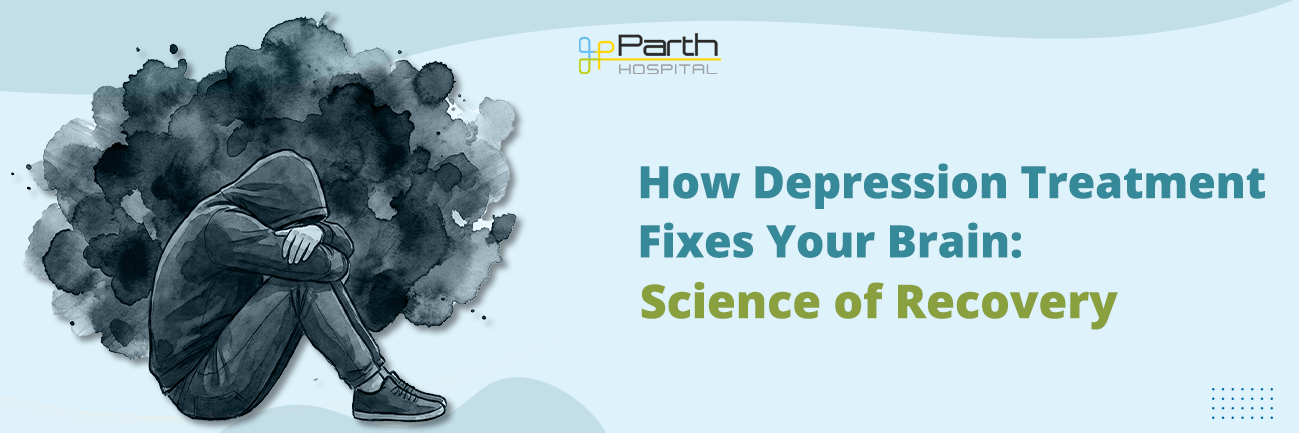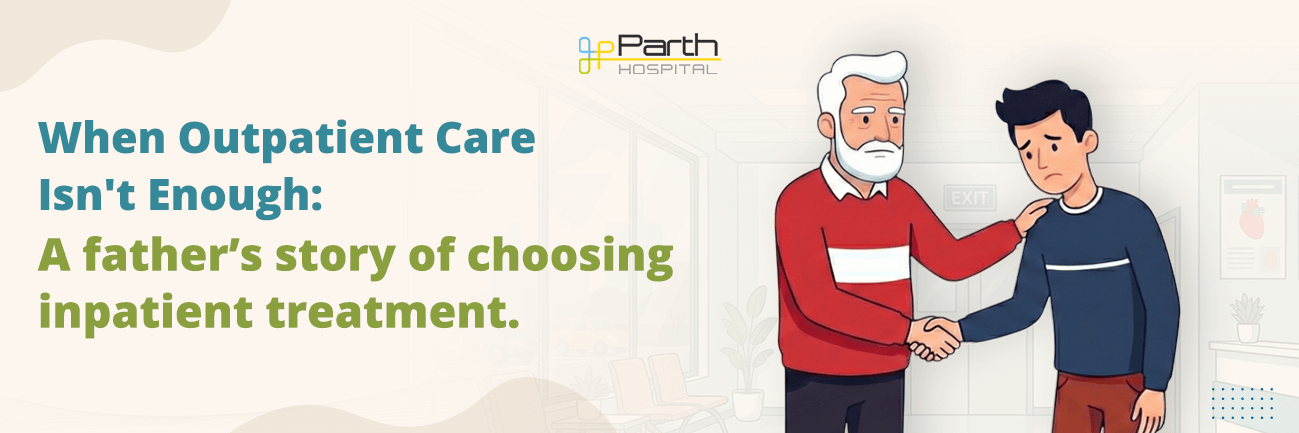Schizophrenia: A Journey Through Complex Realities – Overview
Schizophrenia is a complex mental health disorder that deeply affects how a person perceives reality, thinks, and behaves. It is not merely a condition of mood swings but a chronic illness that disrupts daily life, relationships, and even one’s sense of self.
Beyond the individual, schizophrenia significantly impacts caregivers, who face emotional, financial, and social challenges while providing constant support.
At Parth Hospital, we understand that managing schizophrenia requires empathy, advanced medical care, and comprehensive caregiver support. Our treatment approach includes scientifically backed therapies such as medication, Electroconvulsive Therapy (ECT), and rTMS for auditory hallucinations.
What is Schizophrenia?
Schizophrenia is a mental health condition marked by disturbances in thought, perception, emotion, and behavior. Individuals may struggle to differentiate between what is real and what is imagined, leading to significant challenges in daily life.
Types of Symptoms in Schizophrenia
Positive Symptoms
- Hallucinations: Primarily auditory, where individuals hear voices others do not.
- Delusions: Strong beliefs not grounded in reality, such as paranoia or grandiosity.
- Disorganized Thinking: Incoherent speech, difficulty concentrating.
- Movement Disorders: Abnormal body movements or catatonia.
Negative Symptoms
- Reduced emotional expression and lack of facial expressions.
- Lack of motivation and struggle to complete activities.
- Social withdrawal and avoidance of social interactions.
- Neglect of personal hygiene and daily grooming habits.
Cognitive Symptoms
- Poor concentration and focus.
- Impaired decision-making.
- Memory loss and forgetfulness.
Causes of Schizophrenia
Schizophrenia arises from a combination of biological, environmental, and psychological factors:
- Genetic Factors: A family history increases the risk significantly.
- Brain Chemistry and Structure: Imbalances in neurotransmitters like dopamine and glutamate, and structural changes in the brain.
- Environmental Triggers: Prenatal exposure to malnutrition or infections, early childhood trauma, and chronic stress.
Importance of Accurate Diagnosis
Accurate diagnosis ensures effective treatment planning and management. At Parth Hospital, diagnosis involves:
- Detailed Psychiatric Evaluation: Understanding thought patterns and behaviors.
- Physical Health Checks: Ruling out medical conditions with similar symptoms.
- Family Consultations: Gathering comprehensive background information.
Treatment Options for Schizophrenia
Effective management involves a combination of medications, therapies, and lifestyle support.
Medicines
- Antipsychotics: Both first and second-generation options like Haloperidol, Chlorpromazine, Risperidone, and Olanzapine. Dosages are adjusted based on response and symptom severity.
IV Infusion Therapy
- Administered to restore neurotransmitter balance and stabilize symptoms.
Electroconvulsive Therapy (ECT)
- ECT is used in chronic, resistant cases or when faster recovery with fewer side effects is desired. Some cases may even consider ECT as the first line of treatment. Conducted under anesthesia for patient comfort, it is effective in resetting mood regulation mechanisms.
Repetitive Transcranial Magnetic Stimulation (rTMS)
- rTMS is focused on reducing auditory hallucinations by stimulating the auditory regions of the brain. Non-invasive and requires multiple sessions.
Psychotherapy
- Cognitive Behavioral Therapy (CBT): To manage negative thought patterns.
- Family Therapy: To educate and support caregivers for better management.
Lifestyle and Self-Care Management
- Encouraging routine, a healthy diet, and regular physical activity.
- Avoiding substance abuse and maintaining healthy social connections.
- Practicing stress-reducing techniques like meditation.
Challenges Faced by Caregivers
Caregivers often deal with emotional, financial, and health-related burdens:
- Emotional Strain: Anxiety, stress, and feelings of helplessness.
- Social Isolation: Due to caregiving responsibilities.
- Financial and Occupational Pressure: Reduced work hours or employment loss, rising healthcare expenses.
- Health Risks: Chronic stress leading to health issues like hypertension.
How Caregivers Can Cope
- Seek Professional Support: Regular therapy sessions.
- Join Support Groups: Share experiences and gain insights.
- Respite Care: Taking breaks to avoid burnout.
- Education: Learning about schizophrenia for better understanding.
- Maintain Social Connections: Engage with friends and family for emotional support.
FAQs about schizophrenia
[sp_easyaccordion id=”15703″]
Conclusion
Schizophrenia is a complex but treatable condition. With the right combination of medical treatments, therapies like ECT and rTMS, and comprehensive caregiver support, stability and recovery are achievable.
At Parth Hospital, we specialize in holistic schizophrenia management, ensuring personalized and compassionate care for both patients and caregivers.
If you or a loved one is struggling, don’t hesitate to reach out. Book an appointment.
Source/s: Banner image by freepik.com







